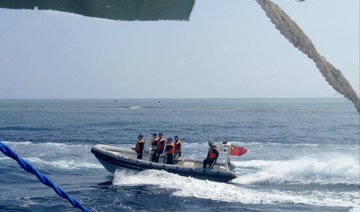SINGAPORE: An Israeli Embassy post on Palestine has stirred outrage in Singapore, with three ministers accusing it of inflaming tensions and disrespecting the city state’s multicultural society.
Israel’s mission published on its Facebook account on Sunday the post that compared mentions of Israel and Palestine in the Qur’an and claimed there was more evidence of the existence of the Jewish state in Palestinian land rather than Palestine.
The post was deleted the same day after Singapore’s Home Minister K. Shanmugam said it was an “astonishing attempt to re-write history” that was “wrong at many levels,” and “unacceptable from the perspective of safety and security” in Singapore.
“It is wrong to selectively point to religious texts to make a political point. Even worse, in this current situation, for (the) Israeli Embassy to make use of the Qur’an for this purpose,” Shanmugam told reporters on Monday.
“The writer of the post should look at UN resolutions, see if Israel’s actions in the past few decades have been consistent with international law, before trying to re-write history.”
A multicultural and multireligious state, Singapore has a significant Muslim minority, accounting for approximately 16 percent of its 6 million population.
“(We) made our views very clear to the Israeli Embassy because it is unacceptable from the perspective of safety and security in Singapore,” Shanmugam said.
“It carries a risk of undermining our safety, security and harmony in Singapore.”
Social and Family Development Minister Masagos Zulkifli, who is also the minister in charge of Muslim affairs, issued a statement saying that the embassy’s post touched on a sensitive matter to both Singaporeans and Muslims.
“It was insensitive and disrespectful and goes against the spirit of mutual respect and understanding that we have worked so hard to build up in Singapore over the years. Nobody should make interpretations that are offensive to another people’s faith, especially selectively using their sacred texts, to make political points,” he said.
“Whether one is a Singaporean or foreigner in Singapore, we must not do or say anything that disrupts the social harmony that is so precious to us in Singapore. Such insensitive and inappropriate messages can cause hurt, and sow distrust amongst different communities in Singapore.”
The post was removed upon intervention from the foreign ministry.
“We communicated to them (that it was) highly inappropriate to make references to sacred texts in order to score political points,” Foreign Minister Vivian Balakrishnan told reporters.
“Bear in mind the fact that we are in Singapore. In Singapore, we do things differently. With all due respect to foreign countries, we think that on the management of race, language and religion, for what it is worth, … we are a positive example.”
Maryam Ismail, analyst at Malaysia’s Institute of Strategic and International Studies, explained that Singapore prioritized social harmony and that inflammatory messaging was not accepted.
“The Israeli Embassy personnel that uploaded the Facebook post clearly overlooked this reality, which is not something that they would have to take into account when talking about the Israel-Palestine issue back home and in Israeli online spaces,” she said.
“I think the Singaporean Law and Home Affairs Ministry’s rebuke was judicious.”
It is very rare, however, for Singaporean authorities to intervene in the conduct of foreign missions, including their social media activity.
“As a manner of principle, foreign embassies in Singapore are free to post on Facebook as long as they do not violate Singapore’s laws, and rules and regulations. I am not aware of other embassies having been in the position where they were requested to take down a post,” James Dorsey, senior fellow at the Middle East Institute of the National University of Singapore, told Arab News.
“Singapore’s government is concerned about communal harmony in Singapore; that has always been a major policy pillar.”
It is not the first time that the Israeli Embassy has stirred up controversy in Asia.
In December, Tel Aviv’s mission in South Korea deleted a video it posted on social media channels after concerns raised by the South Korean government, which said the footage was “inappropriate.”
The video — produced by the embassy — showed an imaginary attack on Seoul by assailants it seemed to liken to Palestinian fighters.


























